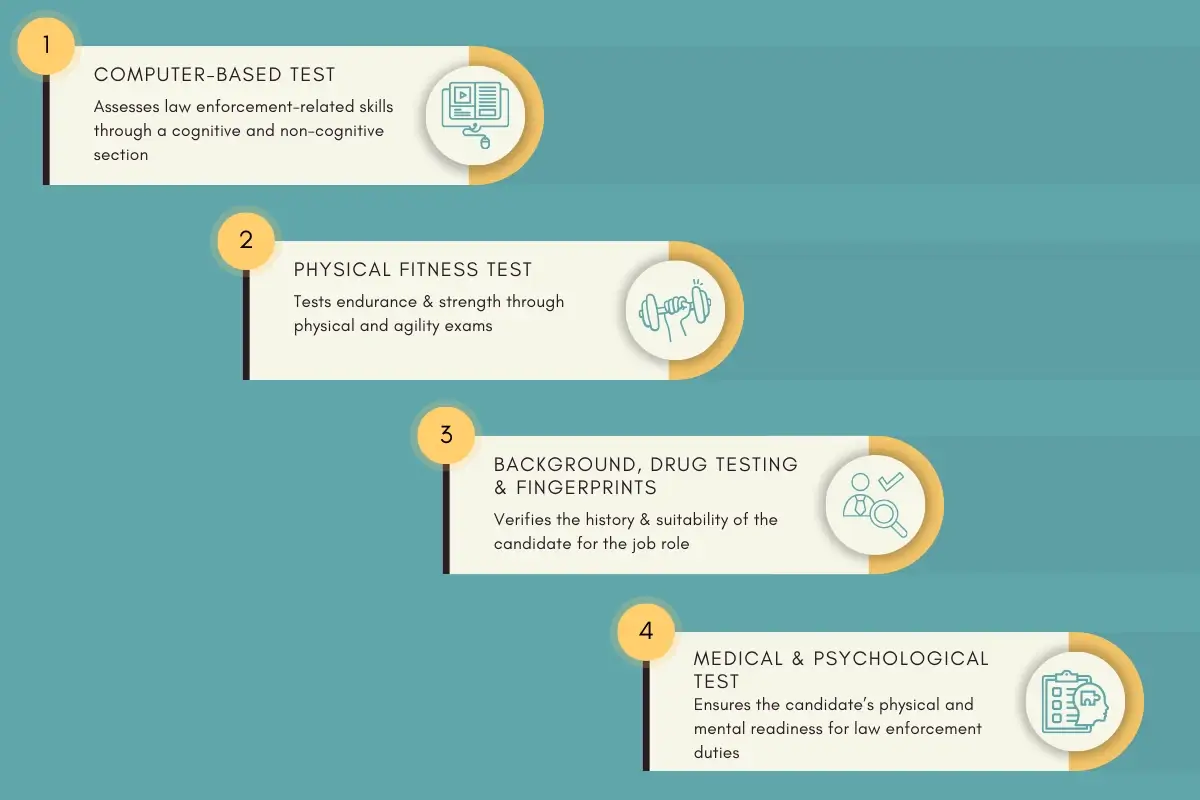Master Pennsylvania Police Officer Exam 2025: Expert Strategies, Free Tests & Tips for Top Scores
- Practice Test
- Curriculum
- Reviews
Becoming an exceptional police officer involves more than just knowledge; it is about your character, experiences, and handling diverse situations. Our prep course is your key to unlocking your full potential for success in the Pennsylvania Police Exam.
Our in-depth prep course is meticulously designed by seasoned professionals who understand the demanding aspects of this test. By integrating actual law enforcement situations, specialized advice, and an evaluation of student capabilities, we have tailored this course to ensure your efficient and effective preparation in a condensed timeframe.
Set out on a journey to master the essentials for not just passing the Pennsylvania Police Exam, but also to emerge as a police officer poised to create a significant difference in the community.
Let’s begin by getting into the intricate details of the test format.

Pennsylvania Police Exam Course
Last Updated: Jan 24, 2025
Course Content
- 1IntroductionBuy this Course: Get full access to all lessons, practice tests and guides.
- 2Information OrderingBuy this Course: Get full access to all lessons, practice tests and guides.
- 3Problem SensitivityBuy this Course: Get full access to all lessons, practice tests and guides.
- 4Deductive ReasoningBuy this Course: Get full access to all lessons, practice tests and guides.
- 5Inductive ReasoningBuy this Course: Get full access to all lessons, practice tests and guides.
- 6Written ComprehensionBuy this Course: Get full access to all lessons, practice tests and guides.
- 7Written ExpressionBuy this Course: Get full access to all lessons, practice tests and guides.
- 8Behavioral AssessmentsBuy this Course: Get full access to all lessons, practice tests and guides.
- 9Work Style QuestionnaireBuy this Course: Get full access to all lessons, practice tests and guides.
- 10Life Experience SurveyBuy this Course: Get full access to all lessons, practice tests and guides.
- 11(Bonus) - Medical ExamBuy this Course: Get full access to all lessons, practice tests and guides.
- 12(Bonus) - Background CheckBuy this Course: Get full access to all lessons, practice tests and guides.
- 13(Bonus) - Polygraph TestBuy this Course: Get full access to all lessons, practice tests and guides.
Application Process
The Pennsylvania Police Exam is a 2.5-hour, computer-based test following LEAB guidelines. The main steps in the hiring process include:

Question Types & Format
The Pennsylvania Police Exam is structured into two primary sections: the Cognitive Ability Test and the Non-Cognitive Section ( or Behavioral Assessment). These sections serve separate purposes in the hiring process.
Cognitive Ability Test
This section of the exam evaluates the essential skills and abilities required for a successful career in law enforcement. It consists of 48 multiple-choice questions, crafted to thoroughly assess your capabilities beyond just the basics.
Let’s take a look at the key topics covered in the cognitive abilities test:
Written Expression: Reckons your ability to organize and present information effectively, ensuring clear communication within a team setting.
Written Comprehension: This part assesses your comprehension of written material pertinent to policing. It presents paragraphs followed by questions to gauge your understanding of the content.
Information Ordering: This skill tests your proficiency in systematically arranging information and using rules with logic, crucial for quick and effective decision-making.
Problem Sensitivity: This focuses on your ability to quickly spot potential issues or challenges, an important skill for effective law enforcement.
Deductive Reasoning: This section requires applying general rules to specific scenarios, a frequent and necessary task in law enforcement.
Inductive Reasoning: This question type involves utilizing overarching principles to solve distinct situations, mirroring a routine and critical aspect of law enforcement work.
Sample Cognitive Ability Questions
Pennsylvania Police Cognitive Practice Test
Non-Cognitive Section
The Non-Cognitive Section is required for testing beyond academic knowledge. It tests your qualities as a person and experiences – important in considering your suitability for a policing career.
This section comprises two main components:
Work Styles Questionnaire
This exam segment reckons your behavior using 66 brief statements. You need to indicate how much you agree with each statement on a 5-point scale. It is recommended to spend about 15 minutes for thoughtful responses in this part.
Here are some example statements:
- I can remain calm and composed in high-pressure situations.
- I am committed to upholding ethical standards and adhering to a strict code of conduct.
- I enjoy analyzing complex problems and finding effective solutions.
- I am comfortable working in a team and collaborating with colleagues from diverse backgrounds.
- I am confident in my ability to make quick and effective decisions, even in uncertain situations
Getting ready for this part of the exam can be difficult because it probes into innate personality, aspects that are not readily changeable. Our course aims to deepen your grasp of this segment. We offer thorough explanations about the evaluation of these traits and detail their role in determining your success in the exam.
Life Experience Survey
This questionnaire is designed to gain deeper insight into your personal history and experiences. It includes 44 questions, each with five response choices (A to E), where you need to choose the option that best reflects your experiences.
It’s advisable to allocate around 20 minutes to this section, ensuring enough time for thoughtful and precise answers. The survey is critical in assessing how your unique life experiences and background contribute to your suitability for a career in law enforcement.
Here are some example questions:
- A:
Consider the moral implications carefully and consult with others.
- B:
Follow established ethical guidelines and policies.
- C:
Trust your instincts and make a quick decision.
- D:
Seek advice from a trusted mentor or colleague.
- E:
Avoid addressing the dilemma and hope it resolves itself.
- A:
Remain calm and organized, creating a detailed plan.
- B:
Prioritize tasks and collaborate with colleagues to meet the deadline.
- C:
Work tirelessly and independently to complete the assignment.
- D:
Communicate your concerns about the deadline to your supervisor.
- E:
Become anxious and struggle to perform under pressure.
- A:
Seek advice and support from friends and family.
- B:
Analyze the situation and develop a strategic plan.
- C:
Rely on your intuition and gut feeling.
- D:
Take time to reflect and meditate on potential solutions.
- E:
Avoid thinking about it and hope the issue resolves itself.
- A:
Act as a mediator and facilitate conflict resolution.
- B:
Encourage open dialogue and find compromise solutions.
- C:
Let team members resolve the conflict themselves.
- D:
Express your concerns and emotions openly.
- E:
Avoid getting involved and hope the conflict dissipates.
- A:
Take the lead in resolving the issue and mediating between parties.
- B:
Offer compromise solutions and encourage open dialogue.
- C:
Step back and let others work it out on their own.
- D:
Express your concerns and emotions openly.
- E:
Avoid confrontations and hope the problem dissipates over time.
Preparing for this section is also hard as it requires self-reflection on your life experiences. However, our course offers guidance and strategies to effectively approach this part. We elucidate the intent behind these questions and how your responses impact your exam evaluation
Why Choose Us?
Our Pennsylvania Police Prep Course, includes expert-led lessons, flexible study guides, and practice questions, enabling personalized learning.
Key features that make it your go-to prep partner:
Practice Questions: The course contains 90 practice questions for each cognitive ability test topic, ensuring comprehensive coverage and thorough preparation.
Life Experiences Survey Preparation: We provide over 200 statements for the Life Experiences Survey, along with 40+ targeted questions, helping you reflect on and articulate your personal experiences effectively.
Work Styles Questionnaire Strategies: Developed by a certified psychologist, our course offers strategic guidance for answering the Work Styles Questionnaire, focusing on presenting your behavioral traits accurately and positively.
In-Depth Solutions and Explanations: Each topic is supported by 7+ sample questions complete with step-by-step solutions, explaining the reasoning and methodology clearly.
Dedicated Study Guides and Practice Tests: For each topic, we offer a separate study guide followed by three practice tests (minimum of 10 questions each), enabling you to reinforce learning and assess your progress.
*Note: LEAB, Pennsylvania State Police, and other trademarks are the property of their respective trademark holders. None of the trademark holders are affiliated with PrepTerminal or this website.

Created by: Michael Learner
Psychometric Test Expert
160 students, 4.7, 30 Reviews
Hey, I’m Michael, PrepTerminal’s Law Enforcement expert. I am here to help you with any questions or concerns you may have about the Pennsylvania State Police Exam Course. Feel free to contact me at [email protected].

